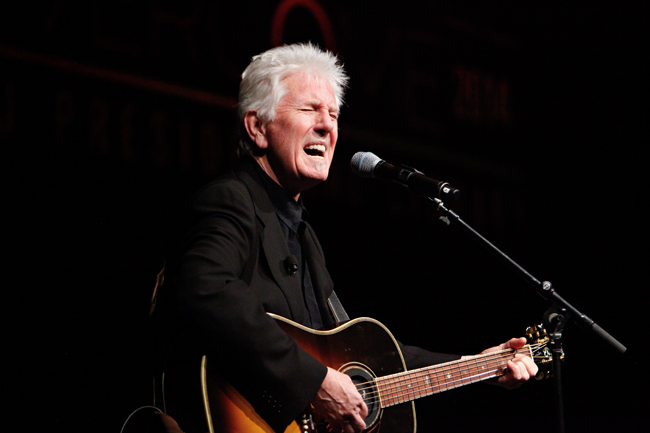The Music and Social Consciousness panel on the first day of the Civil Rights Summit gave a nod to popular culture’s involvement in the civil
rights movement.
Mavis Staples and Graham Nash, two musicians known for their contributions to pop culture and the civil rights movement, spoke Tuesday afternoon, followed by a four-song performance given by Nash. Both Staples and Nash talked about how the civil rights movement and political atmosphere influenced their careers in music.
Singer-songwriter Patty Griffin introduced the speakers, and the panel was moderated by Bob Santelli, the executive director of the GRAMMY Museum.
Staples, a rhythm and blues and gospel artist from soul group The Staples Singers, said she attributes her lifetime as a gospel singer to meeting Rev. Martin Luther King Jr. early in her career.
“I think that, if he can preach it, we can sing it,” Staples said. “That was the beginning of our writing of civil rights songs, freedom songs, message songs and the first one was ‘March Up Freedom’s Highway.’”
Throughout the beginning of her career, Staples spent time with King. She said her favorite memories with the man most people saw as stoic and serious were moments of laughter.
“[I] just loved to hear Dr. King’s laughter,” Staples said. “He had jovial laughter.”
Staples said that she continues to sing freedom and gospel songs in her performances today.
“These kids, you know, they weren’t there,” Staples said. “I was there, and I’m still here, and I’m bringing it to you. I’m still on the battlefield, y’all, I’m on the battlefield, and I’m fighting, everyday.”
After Staples left the stage, Nash, a singer-songwriter from the folk rock group Crosby, Stills & Nash, entered and played three songs from earlier in his career that all reference political events from the late 1960s and early 1970s, in addition to one new song.
Before he played the Crosby, Stills, Nash & Young song “Ohio,” which references the 1970 shootings at Kent State, Nash said the group had to push their label to release the song so soon after releasing “Teach Your Children” just a few weeks prior.
“When America starts to kill its own children, we’re in deep trouble here, so let’s put this out,” Nash said. “We must make sure that we make it a better place. We can make it a better place. There’s no doubt about it.”
While many of Nash’s songs are focused on civil rights and freedom issues, he said he doesn’t feel like he has a personal responsibility to spread those messages.
“I have to express myself, and the way that I do that is through art and music,” Nash said. “I had a responsibility to talk about stuff that bothers me. I have to get my feelings out.”


















